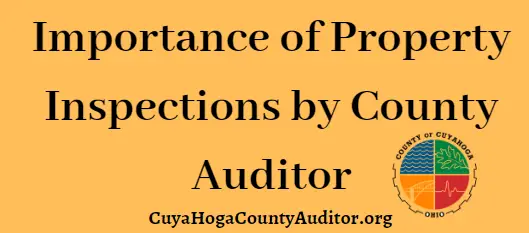Property inspections conducted by county auditors play a crucial role in maintaining the integrity of property ownership, taxation, and public safety. In this article, we’ll delve into the significance of these inspections and how they contribute to various aspects of community welfare.
Property Inspections by County Auditor
Property inspections, overseen by county auditors, involve the assessment of properties to ensure compliance with regulations, evaluate their value, and identify any safety hazards. The county auditor serves as a key figure in this process, overseeing assessments and ensuring fairness.
Purpose of Property Inspections
Property inspections serve multiple purposes. Firstly, they ensure that properties adhere to local regulations and standards, ranging from building codes to zoning laws. Secondly, inspections help determine the value of properties, which is crucial for accurate taxation. Lastly, they help identify safety hazards, ensuring the well-being of occupants and surrounding communities.
Importance of Property Inspections by County Auditor
Maintaining Fair Property Taxation
Property inspections conducted by county auditors ensure that all properties are assessed fairly for taxation purposes. This fairness is vital for maintaining public trust in the taxation system and ensuring that each property owner contributes equitably to public services and infrastructure.
Ensuring Equity in Property Assessments
By conducting regular inspections, county auditors can identify discrepancies in property assessments. This helps rectify disparities and ensures that property taxes are levied uniformly across different properties, regardless of their location or ownership.
Protecting Public Safety
Property inspections also play a critical role in safeguarding public safety. By identifying potential hazards such as structural weaknesses, electrical faults, or fire risks, inspectors can prompt property owners to take corrective action, thereby reducing the likelihood of accidents or disasters.
Preserving Property Values
Regular inspections help maintain property values by ensuring that neighborhoods remain safe, attractive, and well-maintained. Properties in compliance with regulations and free from safety hazards are more desirable to buyers, contributing to stable property values and vibrant communities.
Supporting Urban Planning and Development
Inspections provide valuable data for urban planners and policymakers. By understanding the condition and use of properties within their jurisdiction, authorities can make informed decisions regarding zoning, infrastructure development, and community services.
Process of Property Inspections
Property inspections typically begin with notification to property owners, informing them of the upcoming assessment. Inspectors then visit the properties to conduct thorough examinations, documenting their findings and any necessary corrective measures.
Challenges in Property Inspections
Despite their importance, property inspections face several challenges. Limited resources, including funding and personnel, can hinder the frequency and thoroughness of inspections. Additionally, some property owners may resist inspections due to privacy concerns or perceived inconvenience. Moreover, changing regulations and evolving property standards pose ongoing challenges for inspectors.
Strategies for Effective Property Inspections
To overcome these challenges, counties can implement various strategies. Leveraging technology, such as remote sensing and data analytics, can streamline inspection processes and improve efficiency. Collaboration with other agencies, such as building departments and fire services, can enhance inspection capabilities and resource allocation. Public education and outreach efforts can also foster understanding and cooperation among property owners, encouraging compliance with inspection requirements.
Benefits of Regular Property Inspections
Regular property inspections offer numerous benefits to both property owners and communities. Early detection of issues allows for timely intervention, preventing minor problems from escalating into major concerns. Enhanced property values contribute to economic stability and prosperity, benefiting homeowners and local businesses alike. Furthermore, improved community well-being, stemming from safer and more attractive neighborhoods, enriches the quality of life for residents.
Conclusion
Property inspections conducted by county auditors are essential for maintaining fair taxation, ensuring property equity, protecting public safety, preserving property values, and supporting sustainable development. By addressing challenges and implementing effective strategies, counties can maximize the benefits of inspections, contributing to thriving communities and vibrant economies.
FAQs
1. Are property inspections mandatory?
- Yes, property inspections are typically mandated by local regulations to ensure compliance with safety standards and taxation requirements.
2. How often are properties inspected?
- The frequency of property inspections varies depending on local policies and property characteristics. Some properties may be inspected annually, while others may undergo inspections less frequently.
3. What happens if a property fails inspection?
- If a property fails inspection, the owner is usually required to address the identified issues within a specified timeframe. Failure to comply may result in fines or legal action.
4. Can property owners request inspections?
- In some jurisdictions, property owners can request inspections voluntarily to identify potential issues or ensure compliance with regulations.
5. How can I prepare for a property inspection?
- To prepare for a property inspection, ensure that your property is well-maintained, free from safety hazards, and compliant with applicable regulations. Address any known issues before the inspection date.
